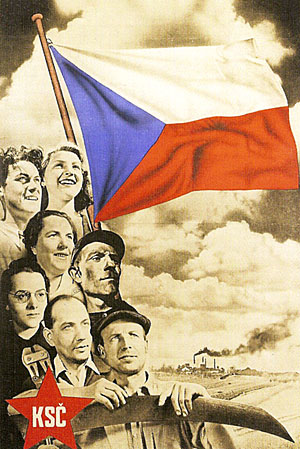 |
Are the Maoists aspiring to capture the state in Nepal? For those preoccupied with the group's radical political agenda, tactical commitment to democratic pluralism, and a semi-militant structure that reserves reverting to violence as a possible strategic option, this debate has continued to fascinate. As an outsider from a post-communist country (the former Czechoslovakia), where real-life implementation of Marxism-Leninism irrevocably altered the whole socio-economic makeup of the nation, there is a temptation to see Nepali Maoists as a South Asian reincarnation of KSC, the communist party of Czechoslovakia. It is the specificity of the environment I was raised in that makes me think of potential parallels and differences between the rise of Maoism in Nepal and the tumultuous year of 1948 that so drastically affected post-WWII Czechoslovakia.
The degree of ultra-left tendencies present in a given society is typically defined by the pervasiveness of feudal structures inherited from previous regimes. The greater the feudal oppression, the greater the likelihood of simmering social grievances being transformed into open revolt. In the land of the Czechs and Slovaks, the autocratic rule of the Habsburg empire collapsed in 1918. In turn, the ensuing inability of the First Republic (1918-38) to address key social concerns, coupled with the effects of the Great Depression and WWII, helped prop up strong communist sentiments in society. Czechoslovak communists were quick to capitalise on lingering disillusionment with the former 'rightist-oriented' regime and took over the state in 1948.
In Nepal, the CPN(Maoist)'s fight against the workings of semi-/feudalism lies at the heart of the movement. Given the country's domestic politico-historical context, communist ideals soon found resonance with ordinary, marginalised people. The Nepali Maoists learned how to mobilise the neglected rural population effectively.
The political dimension of communism bears similarly interesting parallels. At the height of Soviet influence in Czechoslovakia, KSC sought to use multi-partyism to precipitate constitutional changes in the country. Upon a massive victory in the 1946 parliamentary elections, KSC began to penetrate all the Czechoslovak institutions while simultaneously discrediting opposition parties, citing their alleged incapacity to solve social problems.
This escalated into major political crisis, marked by the setting up of paramilitary 'People's Militias' (corollary to what the Maoists decided on in May 2003), the nationwide arrests of opposition leaders, infiltration of the state security apparatus, crackdowns on independent media and mass demonstrations to make then President Bene� succumb to the 'will of the people'. The state police, which was being gradually transformed into a KSC-loyal institution, was instrumental in legitimising this. This had profound effects on the functionality of the 'National Front', a coalition of all 'approved' post-1945 political parties, which was paralysed by late 1947 due to KSC's growing ability to bypass consensus negotiations. The state takeover was completed in Febuary 1948 with the formation of an all-KSC government.
Despite such parallels, the political influence of CPN(M) is yet to reach such heights, the Cold War is long over, the respective domestic contexts are different and most importantly, the ideological agenda of Nepali Maoists is significantly different from what the Czechoslovak communists advocated more than 60 years ago. But both sets of communists attempted to ride on the weaknesses of democratic competition.
Electoral success legitimises government interference into rights under a working democratic framework. Further, engaging in a 'nonviolent overthrow of the state' looks far more pragmatic than waging an armed struggle today. Nepali Maoists have gradually embraced this tactic over time which, in turn, has enabled them to reach out to a much wider constituency than during the first phase of the 'People's War'. But there have been further obstacles on the way to 'glorious communism', as Prachanda once put it. The most recent is the current intraparty split over the choice of the next PM, which considerably weakens the internal cohesiveness of the organisation. In addition, the inability of the party to form coalitions across the political spectrum is another reason why the Czechoslovakian scenario is unlikely.
It would be a serious mistake to judge Nepali Maoists through the lens of George Orwell's totalitarian spectre. Even though they might have been pursuing a forcible change of the system in the first years of the insurgency, the party's willingness to promote socialism via multiparty symbiosis must be a reason for cautious optimism. On the other hand, the structural perils of the movement, mainly the reluctance to give up MLM as a guiding ideological precept, gives rise to suspicions and anxious polemics. Is resumption of civil war feasible? Nobody knows, but unless thorough de-militarisation, democratisation and accommodation of the CPN(M) is finalised, Nepal's political parties attain a desirable level of democratic consciousness, and India's inadequate policies vis-�-vis Nepal undergo serious revisions, it may be hard to dismiss the 1948 Czechoslovakian scenario as a historical parallel.
READ ALSO:
Strategic selfishness, PRASHANT JHA
Hitting three centuries, PUBLISHER'S NOTE
Trial by media, CK LAL
Mind the children, INDU NEPAL
Ecosystem Nepal, ASHUTOSH TIWARI
Valley belly, BUDDHA BASNYAT



